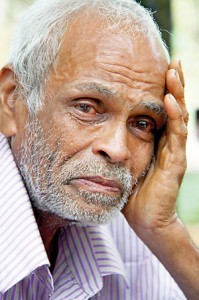News
All gone in an instant
View(s):“We are not beggars,” the monk said, his voice quivering. “We are merely helpless at this moment in time.” Then he stopped speaking, hid his face behind his fan and wiped his eyes with the edge of his saffron robe.
Ven. Pahiyangala Chandima Thera was delivering a sermon on Thursday at the seventh day alms giving of 22 villagers who died in a massive landslide during the early hours of May 26. It was held in one of three forlorn houses left standing at Jayalathgoda in the Bulathsinhala division of the Kalutara District. The hamlet is all but gone.
Twenty-five Buddhist monks attended the ceremony. Among them was Ven. Yatagampitiye Ananda Himi, a priest studying at a pirivena in Matugama. He wore a uniform expression throughout the ceremony. He did not cry. He walked everywhere briskly, attending to rituals and other duties. Nothing in his demeanour revealed that he had lost his entire family in the same landslide – mother, father and three siblings, aunts, uncles and cousins.
As with every disaster, the tales emerging from the Kalutara district (which the Sunday Times visited this week) are wrenching. Floods and countless small earth slips occurred in addition to several major ones. Scores are still missing, buried under the sticky, heavy earth that had absorbed water like a sponge and come sliding down over sleeping households. All the earth slips occurred between 3-4 am on May 26. They were triggered by unexpectedly high rainfall within a space of a few hours – around 300mm between 1-3 am. The Bulathsinhala area alone had 419.26mm within 24 hours.
“If there is 300mm of rain within such a short gap, landslides can occur even in the Sinharaja forest,” said Harsha Ekanayake, who oversees the Kalutara District for the National Building Research Organisation (NBRO). The NBRO’s last landslide warning on May 25 was issued at 10pm. At that hour, H. Gamini was still awake in his home at Dapiligoda in Agalawatta. He didn’t trust the deluge. It had been raining the whole day. The 43-year-old former Commando counted 22 years in military service and was wounded thrice in action. His family even held a funeral service for him once after receiving false information that he was dead.
Since retirement two years ago, Gamini invested his military pension in a catering business and started building his house. Around 3.30 am on May 26, he heard a loud sound followed by a crash. Earth and water came gushing down the hill behind his precious house. He ran out with his wife and children but had no time to take anything. His catering equipment was buried. The house was in ruins.
Gamini’s 15-year-old son will sit his O/Levels in December but now has no books. His eight-year-old daughter also has nothing. They are left with his monthly pension which is hardly sufficient to meet tuition fees.
Unlike in other areas where several houses were destroyed, Gamini’s home is the only one in his village to be damaged. This means it escapes the attention of authorities who are dealing with entire settlements buried in mud. The house has been classified as “fully damaged” but he doesn’t know if he will receive compensation.

G.A. Leelasiri
To make matters worse, the location has been classified as hazardous by the NBRO. Gamini has shifted his family into his parents’ home but he cannot stay there long as his younger brother will soon move in with a new bride. “I have to start from scratch again,” he said. “It’s difficult when you are left with nothing.” He is fully aware that his alertness saved his family – and is thankful for it. In Yatagampitiya, at the base of the Nagahadola landslide, there is much more despondency. Here, Dulanjana Madushanka has lost his 14-day-old baby girl; his brother, Dilan Sanjeewa, is grieving the death of his five-year-old son. The two children were swept away by the river and are now buried in the garden of what used to be their house.
Their grandfather, 65-year-old G. A. Leelasiri, wanted a photograph with the graves. His dog, Buddy, followed him closely. Leelasiri occasionally shook his head in despair and cried while speaking of the children. The baby did not even have a name when she died. There had been a loud sound. A landslide had obstructed the swollen river, causing it to overflow. The water slammed in two waves into houses along the river bank. The first did much of the damage.
Dulanjana and Dilan spent hours in the water, rescuing people. But they couldn’t save their own. They have just one request from the Government – a plot of land with a roof above their heads in a safe place. “We have nowhere to go,” they pleaded. “Are we to live in bus shelters? Dilan’s wife is in hospital after having delivered another child. She does not know her son is dead. And they can’t bring her home – because they have no home.

